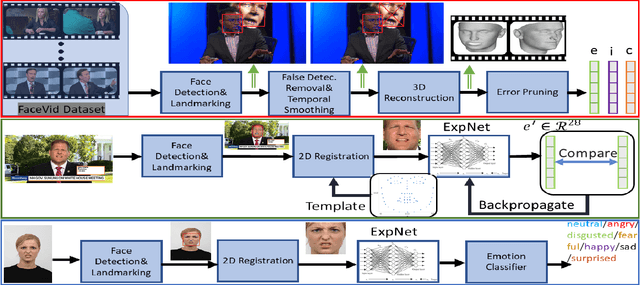Giorgos Giannakakis
Reflections on Diversity: A Real-time Virtual Mirror for Inclusive 3D Face Transformations
Mar 25, 2025Abstract:Real-time 3D face manipulation has significant applications in virtual reality, social media and human-computer interaction. This paper introduces a novel system, which we call Mirror of Diversity (MOD), that combines Generative Adversarial Networks (GANs) for texture manipulation and 3D Morphable Models (3DMMs) for facial geometry to achieve realistic face transformations that reflect various demographic characteristics, emphasizing the beauty of diversity and the universality of human features. As participants sit in front of a computer monitor with a camera positioned above, their facial characteristics are captured in real time and can further alter their digital face reconstruction with transformations reflecting different demographic characteristics, such as gender and ethnicity (e.g., a person from Africa, Asia, Europe). Another feature of our system, which we call Collective Face, generates an averaged face representation from multiple participants' facial data. A comprehensive evaluation protocol is implemented to assess the realism and demographic accuracy of the transformations. Qualitative feedback is gathered through participant questionnaires, which include comparisons of MOD transformations with similar filters on platforms like Snapchat and TikTok. Additionally, quantitative analysis is conducted using a pretrained Convolutional Neural Network that predicts gender and ethnicity, to validate the accuracy of demographic transformations.
Real-time Facial Expression Recognition "In The Wild'' by Disentangling 3D Expression from Identity
May 12, 2020



Abstract:Human emotions analysis has been the focus of many studies, especially in the field of Affective Computing, and is important for many applications, e.g. human-computer intelligent interaction, stress analysis, interactive games, animations, etc. Solutions for automatic emotion analysis have also benefited from the development of deep learning approaches and the availability of vast amount of visual facial data on the internet. This paper proposes a novel method for human emotion recognition from a single RGB image. We construct a large-scale dataset of facial videos (\textbf{FaceVid}), rich in facial dynamics, identities, expressions, appearance and 3D pose variations. We use this dataset to train a deep Convolutional Neural Network for estimating expression parameters of a 3D Morphable Model and combine it with an effective back-end emotion classifier. Our proposed framework runs at 50 frames per second and is capable of robustly estimating parameters of 3D expression variation and accurately recognizing facial expressions from in-the-wild images. We present extensive experimental evaluation that shows that the proposed method outperforms the compared techniques in estimating the 3D expression parameters and achieves state-of-the-art performance in recognising the basic emotions from facial images, as well as recognising stress from facial videos. %compared to the current state of the art in emotion recognition from facial images.
 Add to Chrome
Add to Chrome Add to Firefox
Add to Firefox Add to Edge
Add to Edge